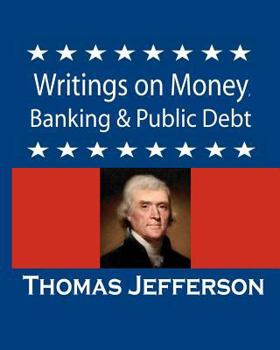Writings on Money, Banking & Public Debt: Excerpts from the Memoirs, Correspondence and Private Papers
Jefferson's experience with excessive paper money issues encompassed three periods: the colonial period, the Revolutionary War, and the state-bank emissions 1811-1816, resulting in widely fluctuating prices, and disruptions of debtor-creditor relationships demanding a banking systems to promote economic stability to which he answered in his letters and proposals. Jefferson's money and banking proposals were similar to those of David Hume more than a century earlier. Jefferson's plan for monetary reform made the following demands. That: -All emissions of paper money by private banks be prohibited. -States would voluntarily transfer the exclusive right of issuing paper money to Congress, suggesting that such emissions for general circulation should be limited to wartime financing and gradually redeemed through taxes when the emergency was over. -Bank lending be limited to the quantity of funds deposited with them. -Large notes could be left in circulation for major commercial transactions (in lieu of specie) without damaging the system, but should usually be made by bills of exchange. The more recent writers, like Jefferson, have little confidence in a monetary system based on demand for bank credit as the determinant of the money supply. As Irving Fisher put it, "our national circulating medium is now at the mercy of loan transactions of banks; and our thousands of checking banks are, in effect, so many irresponsible private mints." Fisher was also doubtful whether the Federal Reserve System would stabilize money; "for this function the Federal Reserve System is ill fitted in organization, personnel, inclination, and tradition."
Format:Paperback
Language:English
ISBN:1456547674
ISBN13:9781456547677
Release Date:January 2011
Publisher:Createspace Independent Publishing Platform
Length:152 Pages
Weight:0.69 lbs.
Dimensions:0.3" x 8.0" x 10.0"
Customer Reviews
0 rating





